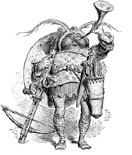
The Return of the Householder
MAKING THE MOST OF THE POST-CAREER ERA — PART I
The COVID-19 pandemic has long spent itself, but the legacy of the quarantine endures. Millions of square feet of office space still go unused while millions of workers remain home. What does this change mean for our common economic future? What if those workers never come back? What if more follow suit or, rather, trade suits for overalls and sunhats?
The answer: That might not be such a bad thing. The time has come to rethink some long-held assumptions, in particular, those tied to the modern “career.” We dedicate the best years of our lives to it; we sacrifice our families for it; we even risk life, limb, and atherosclerosis on asphalt beltways for it. One of the assumptions behind going to work, of course, is that we go to it. The root of the words “career” and “car” are the same: the Latin word carrus, meaning “chariot.”
The career, multiplied by countless careening vocational trajectories, more or less defines our collective way of life. We generate this life by traveling down the ever-narrowing preparatory channels of education and specialization. Some stop early, settling for a “job.” Those who soldier onward, disproportionately white males like me, keep at it until arriving at the higher-paying, higher-status, bona-fide “career.”
But if careerdom is the cornerstone of our social edifice, the mobility of careerists is shaking it to pieces. Here’s the latest jolt: According to a recent article in the Wall Street Journal, finding meaning at work is now more important for most people than making money. In the past couple years, close to half of all jobholders have quit their positions in search of less “green” but more fulfilling pastures.
You May Also Enjoy
We must try to understand the rich corpus of Catholic social doctrine in its context and entirety by reading and consulting the original documents.
In its universal concern, the Church cannot be a mouthpiece for the West, even if, as a result, the Pope is accused of “misunderstanding the free-market economy.”
Destiny is leading us to home-based arrangements reminiscent of those of yore, without brutish living conditions and foreshortened lifespans.

